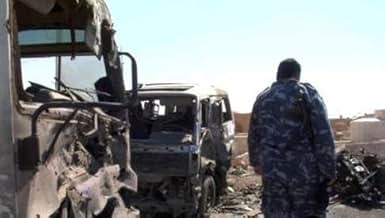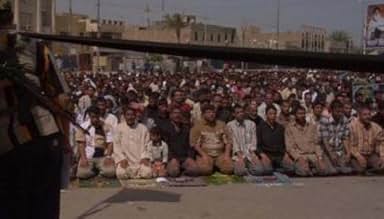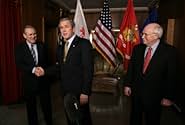IMDb-BEWERTUNG
8,2/10
8785
IHRE BEWERTUNG
Füge eine Handlung in deiner Sprache hinzuA comprehensive look at the Bush Administration's conduct of the Iraq war and its occupation of the country.A comprehensive look at the Bush Administration's conduct of the Iraq war and its occupation of the country.A comprehensive look at the Bush Administration's conduct of the Iraq war and its occupation of the country.
- Für 1 Oscar nominiert
- 12 Gewinne & 19 Nominierungen insgesamt
Campbell Scott
- Narrator
- (Synchronisation)
George Tenet
- Self
- (Archivfilmmaterial)
Dick Cheney
- Self
- (Archivfilmmaterial)
Donald Rumsfeld
- Self
- (Archivfilmmaterial)
Paul Wolfowitz
- Self
- (Archivfilmmaterial)
Colin Powell
- Self
- (Archivfilmmaterial)
Feisal Istrabadi
- Self
- (as Faisal Al-Istrabadi)
Ahmad Chalabi
- Self
- (Archivfilmmaterial)
Empfohlene Bewertungen
It would be nice to think the terrible debacle of the US invasion and occupation of Iraq of 2003 somehow just happened. That it was just a mistake to go there. That things just went wrong. But as this excellent new documentary shows, things went wrong for reasonsbecause of how the war was planned and executed.
Or how it wasn't planned. How ultimately completely unqualified people were left in charge. Here are some of the mistakes that No End in Sight elucidates for us:
1. Nobody knew anything. Out of a basic US cadre of roughly 130 people first sent in to run things, only 5 knew Arabic. Nobody knew from factions. What a Shiite and a Sunni and a Kurd were they found out later. Instead of realizing what leaders would emerge (such as the most popular man in Iraq now, Muqtada Sadr), the neo-cons sent in Ahmed Chalabi, a corrupt exile without credibility or authority, believing he would be the new leader. They didn't know how many troops were required to maintain order, and Rumsfeld, trying to prove a cockeyed theory he had no knowledge to support, chose too few. (Then Army Chief of Staf General Eric Shinseki had pointed this out to the Senate before the war even began.)
2. Nobody, neither Americans nor Iraqis, was designated to maintain order. Chaos reigned. "Stuff happens," said Rumsfeld. No: "stuff" doesn't just happen: it's allowed to happen. As Seth Moulton, a young Marine officer who is one of Ferguson's voices says, "We were Marines. We could have stopped looting." But they were not directed to do so. The troops, already too few, just stood around and watched as Baghdad was torn apart, the national library burned, the national museum looted. All the ministry buildings were dismantled and lootedtellingly, only the Ministry of Petroleum was guarded. Baghdad's water and electricity fell apart, and links with the rest of the country turned into wild and dangerous interzones. Most important of all for the maintenance of order, large caches of arms were unknown to US troopsand insurgents pillaged them.
Iraq was lost in the first week of the occupation. But worse was yet to come. And worse. And worse. A key moment was the replacement of ORHA, The Office for Reconstruction and Humanitarian Assistance (ORHA), headed by Jay Garner, which was not allowed to protect any of its sites, by the CPA, the Coalition Provisional Authority, headed by the arrogant Paul Bremer.
3. This is when the US destroyed the country's human infrastructure, and in so doing sowed the seeds of insurgency and civil war. The occupation fired the entire Iraqi standing army, half a million officers and men alike, and dismissed and barred from work 50,000 "Baathist" government officials and employees. Rendering all these people unemployed dealt a huge economic blow to the country in itself. But far worse than that, it led to permanent conflictultimately to civil war. It created many enemies, and it left no one to work with. At this point the goodwill the Americans had won by toppling the despotic regime of Saddam Hussein was lost. The violence and lawlessness that had been allowed to proceed unchecked began to become organized. Began to have a cause.
4. Many of the Americans sent in to help with occupation and reconstruction had nothing to work with. Ambassador Barbara Bodine (in charge of Baghdad in spring 2003) arrived to find offices supplied to her and her staff that were empty rooms with no computers, not even telephones. But as she says on screen, it didn't matter because they had no phone listsand no one to call.
Nir Rosen is one of the most knowledgeable and independent American journalists in Iraq and a producer and talking head of this film. As he has recently said, Iraq today, four and a half years later, is a region of city-states, a source of instability to the whole area, to Syria, Jordan, Lebanon, Israel, Iran, even perhaps to Egypt. Pacifying and controlling Baghdad no longer means anything because Baghdad doesn't control the countryif you can call it a country. The US forces are just another militia, the most hated but not the most effective.
First-time director Charles Ferguson gives us the various figures, the cold facts, the cost, the numbers of dead and wounded. But what most matters is what people have to say, and Ferguson has assembled some key talking heads. These include former Secretary of State Richard Armitage, Ambassador Bodine, Colin Powell's former chief of staff Col. Lawrence Wilkerson, Col. James Hodges, soon-replaced Iraq viceroy Jay Garner (who like others strenuously objected to the dismissal of the army and the debathification, but was ignored by his replacement, Paul Bremer), Bremer adviser Walter Slocombe, frustrated ORHA functionary Paul Hughes, and other diplomats, journalists, officers, and enlisted personnel who were there in Iraq after the invasion.
Ferguson has a doctorate from MIT, where he has taught; is a member of the Council on Foreign Relations and the Brookings Institution (he's an insider!); and has authored three books on information technology. His approach is analytical. The basic problem was that the usual suspectsBush, Cheney, Rumsfeld, & Co.had spent virtually no time on planning the aftermath of "Shock and Awe"--the occupation. It was all planned, skimpily, at the last minute, deliberately ignoring all the experts' advice.
No End in Sight is not so much an indictment or a polemic or a proposal as a post-mortem. Its aim is to lay out the whole devolution process that took place under US control of Iraq. Never mind the run-up to the war, the justifications, the aims. Here is the story that shows the situation might have been handled better. Things are much worse.
We get to see a lot of political documentaries now so we have learned to judge them. This is a very fine oneand for Americans an essential one.
Or how it wasn't planned. How ultimately completely unqualified people were left in charge. Here are some of the mistakes that No End in Sight elucidates for us:
1. Nobody knew anything. Out of a basic US cadre of roughly 130 people first sent in to run things, only 5 knew Arabic. Nobody knew from factions. What a Shiite and a Sunni and a Kurd were they found out later. Instead of realizing what leaders would emerge (such as the most popular man in Iraq now, Muqtada Sadr), the neo-cons sent in Ahmed Chalabi, a corrupt exile without credibility or authority, believing he would be the new leader. They didn't know how many troops were required to maintain order, and Rumsfeld, trying to prove a cockeyed theory he had no knowledge to support, chose too few. (Then Army Chief of Staf General Eric Shinseki had pointed this out to the Senate before the war even began.)
2. Nobody, neither Americans nor Iraqis, was designated to maintain order. Chaos reigned. "Stuff happens," said Rumsfeld. No: "stuff" doesn't just happen: it's allowed to happen. As Seth Moulton, a young Marine officer who is one of Ferguson's voices says, "We were Marines. We could have stopped looting." But they were not directed to do so. The troops, already too few, just stood around and watched as Baghdad was torn apart, the national library burned, the national museum looted. All the ministry buildings were dismantled and lootedtellingly, only the Ministry of Petroleum was guarded. Baghdad's water and electricity fell apart, and links with the rest of the country turned into wild and dangerous interzones. Most important of all for the maintenance of order, large caches of arms were unknown to US troopsand insurgents pillaged them.
Iraq was lost in the first week of the occupation. But worse was yet to come. And worse. And worse. A key moment was the replacement of ORHA, The Office for Reconstruction and Humanitarian Assistance (ORHA), headed by Jay Garner, which was not allowed to protect any of its sites, by the CPA, the Coalition Provisional Authority, headed by the arrogant Paul Bremer.
3. This is when the US destroyed the country's human infrastructure, and in so doing sowed the seeds of insurgency and civil war. The occupation fired the entire Iraqi standing army, half a million officers and men alike, and dismissed and barred from work 50,000 "Baathist" government officials and employees. Rendering all these people unemployed dealt a huge economic blow to the country in itself. But far worse than that, it led to permanent conflictultimately to civil war. It created many enemies, and it left no one to work with. At this point the goodwill the Americans had won by toppling the despotic regime of Saddam Hussein was lost. The violence and lawlessness that had been allowed to proceed unchecked began to become organized. Began to have a cause.
4. Many of the Americans sent in to help with occupation and reconstruction had nothing to work with. Ambassador Barbara Bodine (in charge of Baghdad in spring 2003) arrived to find offices supplied to her and her staff that were empty rooms with no computers, not even telephones. But as she says on screen, it didn't matter because they had no phone listsand no one to call.
Nir Rosen is one of the most knowledgeable and independent American journalists in Iraq and a producer and talking head of this film. As he has recently said, Iraq today, four and a half years later, is a region of city-states, a source of instability to the whole area, to Syria, Jordan, Lebanon, Israel, Iran, even perhaps to Egypt. Pacifying and controlling Baghdad no longer means anything because Baghdad doesn't control the countryif you can call it a country. The US forces are just another militia, the most hated but not the most effective.
First-time director Charles Ferguson gives us the various figures, the cold facts, the cost, the numbers of dead and wounded. But what most matters is what people have to say, and Ferguson has assembled some key talking heads. These include former Secretary of State Richard Armitage, Ambassador Bodine, Colin Powell's former chief of staff Col. Lawrence Wilkerson, Col. James Hodges, soon-replaced Iraq viceroy Jay Garner (who like others strenuously objected to the dismissal of the army and the debathification, but was ignored by his replacement, Paul Bremer), Bremer adviser Walter Slocombe, frustrated ORHA functionary Paul Hughes, and other diplomats, journalists, officers, and enlisted personnel who were there in Iraq after the invasion.
Ferguson has a doctorate from MIT, where he has taught; is a member of the Council on Foreign Relations and the Brookings Institution (he's an insider!); and has authored three books on information technology. His approach is analytical. The basic problem was that the usual suspectsBush, Cheney, Rumsfeld, & Co.had spent virtually no time on planning the aftermath of "Shock and Awe"--the occupation. It was all planned, skimpily, at the last minute, deliberately ignoring all the experts' advice.
No End in Sight is not so much an indictment or a polemic or a proposal as a post-mortem. Its aim is to lay out the whole devolution process that took place under US control of Iraq. Never mind the run-up to the war, the justifications, the aims. Here is the story that shows the situation might have been handled better. Things are much worse.
We get to see a lot of political documentaries now so we have learned to judge them. This is a very fine oneand for Americans an essential one.
This is an amazing conformation of the Bush administrations utter failure in the handling of the Iraq war. A girl scoot troop could have made better and more informed decisions. Perhaps even a troop of monkeys would have done a better job then Bush's henchmen?
The errors in judgment and lack of military experience within the administration are both appalling and telling of the Bush white house. Every military expert was systematically ignored or sidelined. It's as if the Bush administration's primary and sole interest or concern was the protection and acquisition of Iraq's oil provisions.
This film is a testament to the complete and absolute failure of the Bush presidency.
The errors in judgment and lack of military experience within the administration are both appalling and telling of the Bush white house. Every military expert was systematically ignored or sidelined. It's as if the Bush administration's primary and sole interest or concern was the protection and acquisition of Iraq's oil provisions.
This film is a testament to the complete and absolute failure of the Bush presidency.
Sometimes seeing a documentary that has such immense and complex connotations like the war on Iraq can be so staggering that one might be tempted to rate it highly just based on how compelling the subject matter is. That part of it, of whether it's worthy for a documentary, is important. But first-time director Ferguson does an incredible job of amounting crucial interviews with former Generals and government officials, ex-soldiers, enough footage of Iraq destruction for two or more movies, and a mounting sense of dread over the unequivocal fiasco that what went on leading up to-during-and especially after America invaded Iraq, and the film was more than worthy of a special jury prize at Sundance earlier this year.
It's devastating and infuriating enough to get the people you might be with seeing the film into a heated argument (probably with everyone on the side, at least, that it was profoundly stupid to go into the country to start with, without a real plan anyway), because of the layers that can be taken into account. If one watched the news enough, or read what was available at the time, then some of the information may not be all new-news. But a lot of it is, which throws on fuel to the fire for Ferguson's thesis that with all the mounting mistakes, the most crucial ones came in taking for granted what would happen if say, for example, the Iraqi army was disbanded along with the Ba'ath party (if that's how it's spelled). Interestingly, Ferguson doesn't spend too much time on the blunder that was going into Iraq in the first place; that's for other films and he knows it well (namely Fahrenheit 9/11).
We went in. Now 'what to do next' is really where the cards are all layed out: the looting and rioting, which went on for days and ruined many of Iraq's small places of civilization like museums and libraries (which, of course, Rumsfeld and the US didn't mind and practically encouraged), then after that the whole huge f*** up that was the lack of real planning for after we toppled Sadaam's regime (for Germany after WW2 the plan was layed out two years in advance, for Iraq it started 50 days before the invasion), and very notably Walter B. Slocombe (who comes off stumbling through his interview as he can't answer why he wasn't talking to other advisers about the plans of what to do with the Iraq security) and L Paul Bremer, who crafted the three plans for reconstituting Iraq, which basically created the Insurgency. That part, of course, is a big chunk of No End in Sight, with the blunders continuing on and gaining force with the US involvement in Iraq.
So the question comes first to those thinking about the questions Ferguson lays out through his interview, aside from how in the living hell (literally, if you're over in Iraq) we've now spend two *trillion* dollars over there, which is: Why? To get a documentary like that now probably would make a big enough uproar to get people in the streets. But for now, No End in Sight will have to do.
It's devastating and infuriating enough to get the people you might be with seeing the film into a heated argument (probably with everyone on the side, at least, that it was profoundly stupid to go into the country to start with, without a real plan anyway), because of the layers that can be taken into account. If one watched the news enough, or read what was available at the time, then some of the information may not be all new-news. But a lot of it is, which throws on fuel to the fire for Ferguson's thesis that with all the mounting mistakes, the most crucial ones came in taking for granted what would happen if say, for example, the Iraqi army was disbanded along with the Ba'ath party (if that's how it's spelled). Interestingly, Ferguson doesn't spend too much time on the blunder that was going into Iraq in the first place; that's for other films and he knows it well (namely Fahrenheit 9/11).
We went in. Now 'what to do next' is really where the cards are all layed out: the looting and rioting, which went on for days and ruined many of Iraq's small places of civilization like museums and libraries (which, of course, Rumsfeld and the US didn't mind and practically encouraged), then after that the whole huge f*** up that was the lack of real planning for after we toppled Sadaam's regime (for Germany after WW2 the plan was layed out two years in advance, for Iraq it started 50 days before the invasion), and very notably Walter B. Slocombe (who comes off stumbling through his interview as he can't answer why he wasn't talking to other advisers about the plans of what to do with the Iraq security) and L Paul Bremer, who crafted the three plans for reconstituting Iraq, which basically created the Insurgency. That part, of course, is a big chunk of No End in Sight, with the blunders continuing on and gaining force with the US involvement in Iraq.
So the question comes first to those thinking about the questions Ferguson lays out through his interview, aside from how in the living hell (literally, if you're over in Iraq) we've now spend two *trillion* dollars over there, which is: Why? To get a documentary like that now probably would make a big enough uproar to get people in the streets. But for now, No End in Sight will have to do.
As you may have inferred from my many sardonic comments about the neocons, I oppose the war in Iraq. The documentary No End in Sight confirms my opinion not shared by everyone to be sure. But this documentary, written, directed, and produced by Charles Ferguson, an information technology expert and member of the Council on Foreign Relations and the Brookings Institution, shows in a rare non-ideological way, the mistakes made up to and during the Iraq invasion.
This is not an incendiary Michael Moore screed; it puts the left's argument in cool, rational light for the right to see clearly and attack as is its right. Ferguson grimly reminds us that information about the absence of WMD's was ignored to further an agenda that began immediately after 9/11 with the order to confirm a link between Al-Qaeda and Hussein's Ba'athist regime.
If you want more insanity, how about the order to disband the entire Iraqi army and Ba'ath party members from government service. That 2004 brought an insurgency of disaffected Sunni men who could have been serving in the necessary local army was no surprise. Secretary of Defense Donald Rumsfeld's lack of preparation for post-invasion operations is just another depressing fact brought out by this sober, if not surprising or dramatically compelling documentary.
If you read the New York Times, you won't need the information in No End in Sight, but Ferguson puts it together so carefully and responsibly you might want to refer to it as you debate the neocons who claim the surge is working and the end is in sight. They need glasses, and not rose colored ones. But then retaining political power does mighty strange things to one's vision.
This is not an incendiary Michael Moore screed; it puts the left's argument in cool, rational light for the right to see clearly and attack as is its right. Ferguson grimly reminds us that information about the absence of WMD's was ignored to further an agenda that began immediately after 9/11 with the order to confirm a link between Al-Qaeda and Hussein's Ba'athist regime.
If you want more insanity, how about the order to disband the entire Iraqi army and Ba'ath party members from government service. That 2004 brought an insurgency of disaffected Sunni men who could have been serving in the necessary local army was no surprise. Secretary of Defense Donald Rumsfeld's lack of preparation for post-invasion operations is just another depressing fact brought out by this sober, if not surprising or dramatically compelling documentary.
If you read the New York Times, you won't need the information in No End in Sight, but Ferguson puts it together so carefully and responsibly you might want to refer to it as you debate the neocons who claim the surge is working and the end is in sight. They need glasses, and not rose colored ones. But then retaining political power does mighty strange things to one's vision.
10Tamarast
As a military brat, I wanted to see if it was the military or the Cabinet that was making poor decisions about the Iraqi invasion and the years of occupation. Charles Ferguson presented a well laid out chronological story from 9/11/2001 (the Pentagon scenes were especially tearful, we forget that was hit by a plane as well) to the present. Especially interesting was the history between Iran and Iraqi, and I remember the day in 1979 when we knew of American military families that had to leave in the middle of the night from Tehran. America's backing of Hussein then caught up with us in the 90's. Bush's administration was looking for a connection - WMDs, Al-Qada, something.
I was impressed with the candor of Richard Armitage, Col Paul Hughes, and even with Walter Slocombe. The interviews were interesting, honest, and true.
Last week I watched "Saving Private Ryan" for the first time, and understood that we sent in 350,000 troops to Normandy during and after D-Day. Our ability to have that kind of troop deployment is over, as is the Cold War. Instead we are creating a ticking time bomb (much like we did in backing Hussein against Khomeini in 1980) that I hope will not create instability world wide.
I'm planning on buying multiple copies of this DVD - it is that important, not only for now, but in campaign issues in the next year.
I was impressed with the candor of Richard Armitage, Col Paul Hughes, and even with Walter Slocombe. The interviews were interesting, honest, and true.
Last week I watched "Saving Private Ryan" for the first time, and understood that we sent in 350,000 troops to Normandy during and after D-Day. Our ability to have that kind of troop deployment is over, as is the Cold War. Instead we are creating a ticking time bomb (much like we did in backing Hussein against Khomeini in 1980) that I hope will not create instability world wide.
I'm planning on buying multiple copies of this DVD - it is that important, not only for now, but in campaign issues in the next year.
Wusstest du schon
- WissenswertesMarine Lieutenant Seth Moulton was elected the US Congressman for Massachusetts' 6th District in November 2014.
- Zitate
Seth Moulton: Are you telling me that's the best America can do?... No, don't tell me that... That makes me angry.
Top-Auswahl
Melde dich zum Bewerten an und greife auf die Watchlist für personalisierte Empfehlungen zu.
- How long is No End in Sight?Powered by Alexa
Details
Box Office
- Budget
- 2.000.000 $ (geschätzt)
- Bruttoertrag in den USA und Kanada
- 1.433.319 $
- Eröffnungswochenende in den USA und in Kanada
- 31.533 $
- 29. Juli 2007
- Weltweiter Bruttoertrag
- 1.433.319 $
- Laufzeit
- 1 Std. 42 Min.(102 min)
- Farbe
- Sound-Mix
- Seitenverhältnis
- 1.85 : 1
Zu dieser Seite beitragen
Bearbeitung vorschlagen oder fehlenden Inhalt hinzufügen















